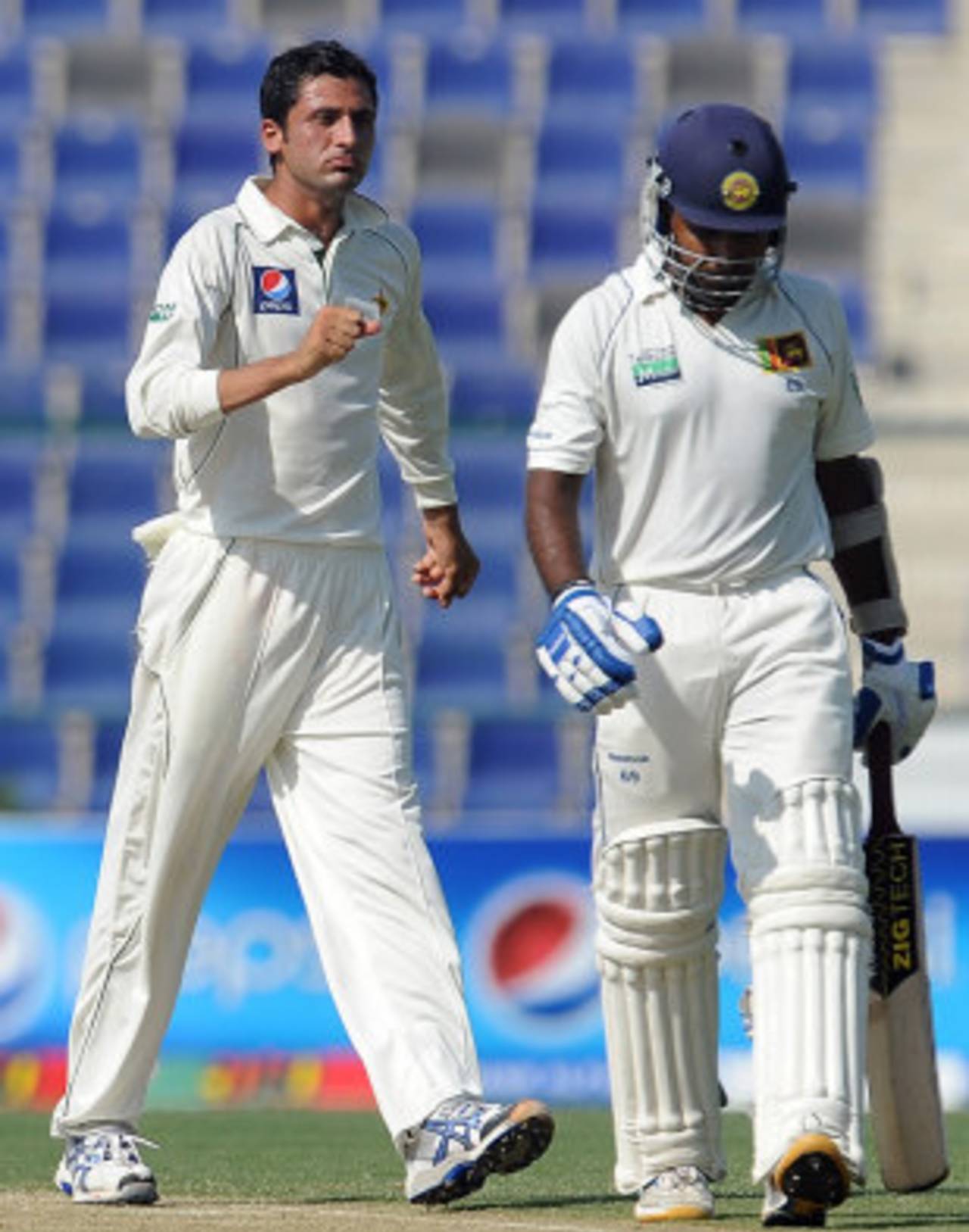They say there are no indispensable men, but evidence suggests that Muttiah Muralitharan just might be one. Of the
13 Tests Sri Lanka played immediately prior to his retirement, they won seven. Of the same number of Tests that they have played since, they have
won zilch. It is usually the presence of a great player that marks the difference between a winning and a losing side. In this series in the UAE, the difference between Pakistan and Sri Lanka is turning out to be the absence of one.
Pakistan are not a side known for their batting. When they made over 500 in the opening Test
in Abu Dhabi, it was for the first time in
24 Tests and 32 months. When Taufeeq Umar went past 200 in the same match, it was the first time a Pakistani opener had done so
since 1992. Even in the second Test,
in Dubai, which Pakistan won, several of their upper order fell to soft dismissals. It is hard to imagine this line-up could have resisted Murali's magic for long.
Test victory is all about availing the chances that come your way, and Pakistan's batsmen have certainly made the most of the opportunity created by the absence of history's greatest offspinner. They secured a first-innings lead of 314 in the first Test, and 164 in the second, and showed no panic in chasing their fourth-innings target in Dubai. Even the opening partnership, Pakistan's long-standing top-order ulcer, has been solid, with a century partnership in the first Test and a stand of 63 in the first innings of the second.
Bowling isn't Pakistan's weakness. Their lacklustre Test record over the last decade is explained by batting failures. They now find themselves one-up going into the final Test against a better-ranked side because their batting has come good.
The bowlers, meanwhile, have been fantastic, taking
38 Sri Lankan wickets (there were two run-outs in the first Test), compared with only 17 Pakistani wickets claimed by Sri Lankan bowlers. Although Saeed Ajmal's offspin was decisive in the second Test, the majority of Sri Lankan wickets (21 of 38, or 55%) have gone to Pakistan's seamers, who once again impressed with their ability to extract blood from a lifeless surface.
Most impressive of all has been
Junaid Khan, who is keeping a bowler of Wahab Riaz's quality out of the team, and is even promising to fill the void left by the departure of Mohammad Amir. Junaid would surely have been Man of the Match and won Pakistan the first Test in Abu Dhabi had critical catches off his bowling not been put down. He runs in with unfailing effort and bowls with a great deal of heart, and has shown increasing command over seam and shape. His concentrated exposure to a fast-bowling legend like Waqar Younis, who was Junaid's coach until recently, could not have been better timed.
Misbah is calm and composed, tactically astute and, every now and then, willing to gamble. Not long ago, Pakistani observers were convinced he could not re-enter a middle order populated by talented newcomers. Now fans are ruing the fact that he is already 37 and won't be around for much longer
Since the infamous Lord's Test of last year, Pakistan have played
nine Tests, winning four, losing one, and drawing four. This period includes away series wins in New Zealand and Zimbabwe, and drawn series against South Africa and West Indies. What accounts for this upswing? A good part of it must be Misbah-ul-Haq's captaincy. He is calm and composed, tactically astute and, every now and then, willing to gamble. He does not gesticulate or react. His career has followed one of Pakistan cricket's oddest trajectories - twice being given up for dead but making a forceful comeback each time. Not long ago, Pakistani observers were convinced he could not re-enter a middle order populated by talented newcomers like Umar Akmal, Azhar Ali and Asad Shafiq. Now fans are ruing the fact that he is already 37 and won't be around for much longer.
Perhaps some part of Pakistan's improved performance can also be attributed to the plugging of the spot-fixing leak. The ICC has already concluded - based on hearings conducted in Doha earlier this year - that it existed. This indirectly suggests that Pakistan are finally playing to their potential. At least Pakistan supporters would like to believe so.
Barring injuries, Pakistan will play an unchanged side in the final Test in Sharjah. They are within reach of a Test series victory over a Sri Lanka team that includes three outstanding players - Kumar Sangakkara, Mahela Jayawardene, and Tillakaratne Dilshan - who are feared and respected around the world, and at least two of whom will find room in any all-time Sri Lankan XI. Pakistan's main enemies now are complacency and the temptation to play for a draw. Misbah's captaincy will be sternly examined in guarding against both.
The arrival of a faint autumn chill this time of year triggers a conditioned reflex, alerting fans to the cricket extravaganza of the home season. Although terrorism fears have once again pushed Pakistan's home matches to the UAE, the large cricket audience in Pakistan is warming to the spectacle.
The time difference is only one hour; the pitches are predictably flat, producing their share of soporific stretches of afternoon play; and there is the same incessant heat and sun. There is also the usual mix of Pakistani faces in the stands, including some with those irritating noise-emitting devices that are a staple of cricket watching in the subcontinent. It is a shame Pakistan cannot play international games on their own soil, but for now this is not a bad substitute.
